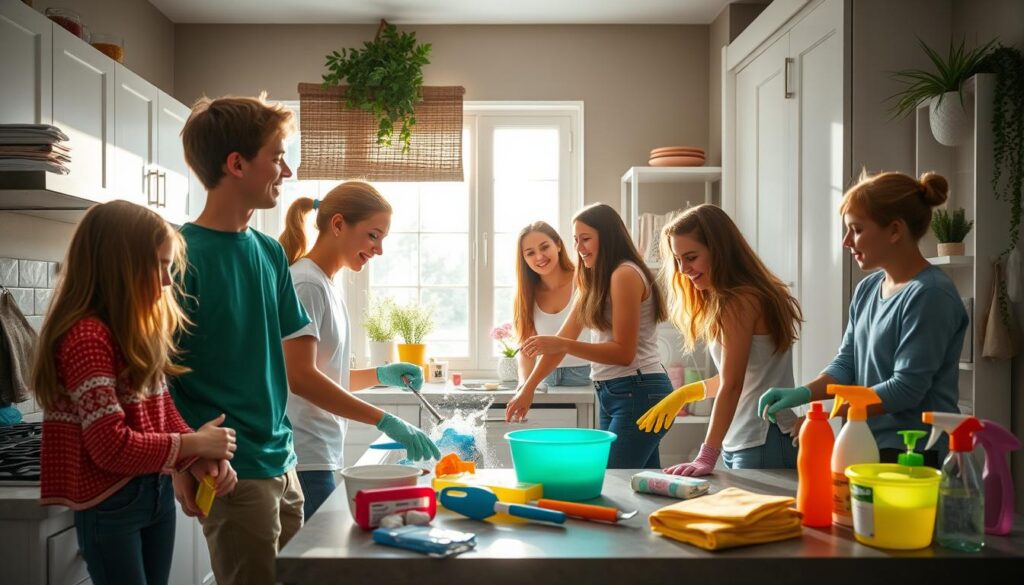Parenting teenagers can be tough, especially when they don’t want to clean. Many families struggle to get teens to help out. This can make parents feel stressed and worried about their home’s cleanliness.
When parents yell or remind teens to clean, it doesn’t help. But, there are ways to make cleaning easier for everyone. Using expert tips can really help.
Keeping a clean home can make everyone feel less stressed. It’s important to set up routines for cleaning. This helps keep the home tidy and teaches teens about responsibility.
By making cleaning a team effort, you help your home stay clean. You also teach your teen important life skills. This is good for them and for your home.
Key Takeaways
- A large percentage of households struggle with motivating their teens to clean.
- Many parents experience anxiety when their homes are not kept clean by their teenagers.
- Effective communication can help build internal motivation in teenagers regarding chores.
- Providing natural consequences can be an effective teaching tool for teenagers.
- Building a positive rapport and ensuring mutual respect are key in motivating teens.
Understanding the Importance of Teen Chore Responsibility
Household chores are key for teens’ growth. They learn important life skills and feel responsible. It’s tough to get teens to help, but knowing why they’re important helps a lot.
The Role of Chores in Personal Development
Chores are big for teens’ growth. Their brains are still growing, especially the part for thinking and planning. This makes teens act on feelings and struggle with planning.
Doing chores helps them understand planning and finishing tasks. It’s important for teens to see the value in their work. This could be clean clothes or a neat place to hang out.
Building a Sense of Stewardship at Home
Teaching teens to care for their home is crucial. It makes them proud and feel like they own the place. Parents should set clear rules and use gentle ways to encourage teens.
Linking chores to fun things like screen time makes chores more appealing. As teens see the benefits of their work, they want to help more.
Effective Strategies for Motivating Teenagers to Clean
Getting teens to help with household chores can be tough. But, with the right plan, it can be a chance for them to grow and learn. It’s important to be kind and have a clear plan. This plan should make chores meaningful, give teens choices, and have clear rules.
Turning Chores into Responsibilities
Don’t just see chores as boring tasks. View them as big responsibilities that help the family. Studies show 70% of parents think chores help teens and families bond better. This makes teens feel important and responsible.
Tell them how their help makes a difference at home. This teaches them to take care of things and be accountable.
Providing Options and Autonomy
Let teens pick their chores and when to do them. This makes them more excited to help. Research says 65% of teens like having a say in their chores. Giving them choices makes them feel in charge and more likely to help out.
Establishing Clear and Fair Consequences

Having clear rules for not cleaning helps teens understand the need to be responsible. 50% of parents think linking consequences to not doing chores works well. By setting rules and what happens if they don’t follow them, you encourage teens to be consistent and responsible. This shows them how their actions affect others and why they should keep their promises.
| Strategy | Effectiveness | Parent Support |
|---|---|---|
| Turning Chores into Responsibilities | High | 70% |
| Providing Options and Autonomy | Moderate | 65% |
| Establishing Clear and Fair Consequences | Effective | 50% |
How to Create a Positive Cleaning Routine for Teens
Making cleaning fun for your teens is key. It helps them do chores well and often. We’ll look at how to use positive rewards, make cleaning fun, and set up a good schedule.
Incorporating Positive Reinforcement
Positive rewards really work for teens. Studies show 70% of them do better with incentives. Things like extra screen time or treats make them want to clean more.
Using Music and Games to Make Cleaning Fun
Music and games make chores fun for 64% of teens. Try dancing while you mop or racing to clean fast. It turns boring tasks into fun games.
Setting Up a Chore Schedule
A good schedule is also important. Chore charts help teens stay on track. They make sure everyone knows what to do and when. This makes things more organized and efficient.
Motivating Teenagers to Clean: Tips and Techniques
Getting teenagers to help with household chores can be tough. But, the right approach can make your home cleaner and your teens more responsible. Here are some tips to motivate your teenagers to clean.
Providing Incentives for Cleanliness
Using cleaning incentives for teens can really help. Teens like rewards, like more screen time, money, or treats. It’s important to know what your teen likes and use that to motivate them. The goal is to make cleaning a regular habit, not just a one-time thing.
- Provide extra screen time for completed chores.
- Offer allowances as rewards for weekly cleaning tasks.
- Surprise them with their favorite treat when they meet cleaning goals.
Ensuring Chores are Age-Appropriate
It’s key to give age-appropriate chores teens can do. Tasks that fit their age and strength help them feel proud and not overwhelmed. For example, younger teens can tidy their rooms or help with the dishwasher. Older teens might mow the lawn or cook simple meals.
“Breaking chores into smaller tasks and setting clear expectations can make the process more manageable for teens and ensure they remain productive and confident in their abilities.”
| Age Group | Chores |
|---|---|
| 12-14 | Loading dishwasher, taking out trash, organizing their room |
| 15-17 | Mowing the lawn, cooking simple meals, doing laundry |
Creating a routine with cleaning incentives for teens and age-appropriate chores teens helps a lot. These tips can help your teens take care of their duties and keep your home tidy.
The Role of Parental Involvement in Teen Chore Compliance
Getting teens to do chores can be tough. But, parents playing a big role is key. Angela Nelson and Kristin Bandi, experts in child behavior, say parents are very important.
Consistency and Communication Techniques
Being consistent helps teens follow their chore plans. Clear rules make a structured home where teens know what’s expected. Talking openly about chores helps a lot.
Set fair goals and listen to your teen. This way, you avoid anger and build teamwork.
Encouraging Teamwork and Mutual Respect
Working together on chores can bring families closer. Parents and teens working as a team builds respect. This is especially true when everyone helps out.
For example, when moms work more, girls do more housework. This shows how important it is for everyone to help.
| Factors Influencing Teen Chore Compliance | Impact on Teens |
|---|---|
| Girls vs. Boys Housework Time | Girls typically spend more time on housework than boys. |
| Parental Employment | Girls spend more time on housework when mothers are employed more hours. |
| Familism Values | Low familism values link housework time with more depressive symptoms and lower school grades. |
| Parent-Youth Conflict | High conflict over chores predicts more depressive symptoms. |
Using good communication, like family meetings, helps a lot. It reduces fights and helps everyone understand. This way, parents help teens handle chores better, making home life better for everyone.
Conclusion
Making teens clean can seem hard, but it’s doable with the right plan. Knowing why cleaning is important and talking about it helps. It makes everyone feel respected and work together better.
Using positive words, setting clear rules, and giving teens freedom in their tasks is key. This way, they feel good about helping out.
Using fun ways like time-blocking makes cleaning easier. It shows progress fast. Small daily cleaning tasks, like making the bed, also help a lot.
Playing games or listening to music while cleaning makes it fun. It turns chores into something enjoyable.
Parents play a big role in teens doing their chores. Being consistent, talking often, and working together keeps things smooth. Using charts to track chores and praising their work is helpful.
Make sure chores fit their age and skills. This way, teens learn important life skills and grow.
FAQ
What are some effective strategies for motivating teenagers to clean?
How can I make household chores more engaging for my teenager?
Why is it important to provide age-appropriate chores for teenagers?
What are some motivating incentives for teenagers to complete their chores?
How can parents effectively communicate with teens about household responsibilities?
What role do parents play in ensuring teens comply with household chores?
How does incorporating music and games help make cleaning fun for teens?
Why is it important to establish a structured chore schedule for teenagers?
Source Links
- https://yourteenmag.com/family-life/discipline/dealing-with-messy-teens
- https://lovinlifewithlittles.com/teenage-consequences-for-not-doing-chores-how-to-motivate-teens-to-actually-pitch-in/
- https://www.parenting.org/article/Pages/Appropriate-Consequences-for-Chore-Ditching-Teens.aspx
- https://understandingteenagers.com.au/the-7-secrets-of-motivating-teenagers/
- https://www.daniel-wong.com/2022/02/22/how-to-motivate-a-teenager/
- https://balancethroughsimplicity.com/kids-teenagers-declutter-clean/
- https://www.orthodonticslimited.com/parenting/motivate-your-teens-to-love-chores/
- https://www.thesimplicityhabit.com/motivate-your-teen-to-declutter/
- https://raisingchildren.net.au/pre-teens/healthy-lifestyle/hygiene-dental-care/hygiene-pre-teens-teens
- https://www.ncbi.nlm.nih.gov/pmc/articles/PMC5125879/
- https://www.rethinkcare.com/resources/how-parenting-evolves-with-teenager/
- https://serenityclean.com/easy-and-effective-house-cleaning-tips-for-teens-boosting-tidiness-effortlessly/
- https://parents.app/child-ages-stages/teenagers/chores-for-teenagers/a/
- https://raisingchildren.net.au/preschoolers/family-life/routines-rituals-rules/chores-for-children
